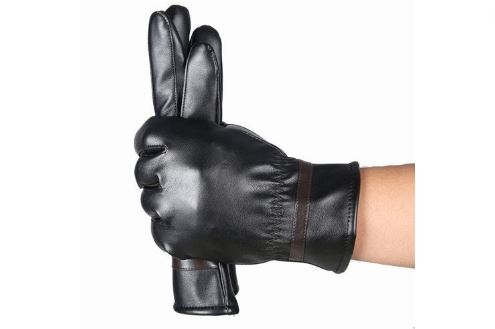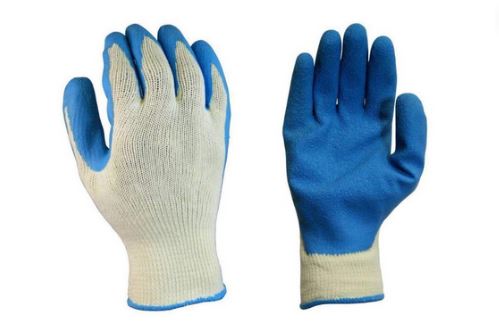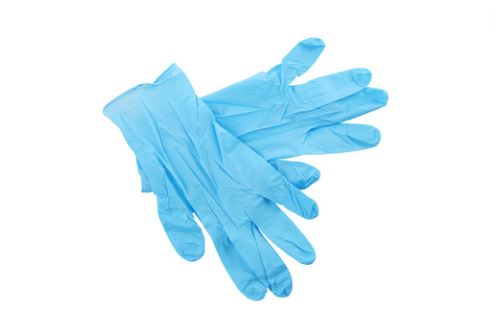Gloves are specialized pieces of fabric designed to individually fit each finger providing cover up to the wrist. There are a variety of these items each type designed to fulfill different roles from accessorizing to safety.
Types of Gloves
Leather Gloves
These are gloves designed from animal skin that has gone through a hardening process referred to as tanning. This process results in a durable and sturdy material.

Advantages
- The leather used to design the gloves is durable and strong and can be used for a long time.
- These gloves are lined to make them comfortable and are often designed to be a perfect fit.
- They offer protection from minor injuries as well as from adverse weather conditions.
- Leather gloves provide excellent grip as well as dexterity allowing you to utilize them for various functions.
Limitations
- The leather used to design the gloves is not breathable.
- Prolonged exposure to adverse elements including unfavorable weather conditions may damage the gloves.
- The material is not completely waterproof and will allow water through.
- Leather gloves that are not lined can be irritating to the skin.
Uses
Leather gloves are versatile and have a variety of applications including;
- Ranching
- Farming
- Landscaping
- Gardening
- Carpentry
- Oil and gas
- Utility
- Welding
Fabric Gloves
These are gloves designed using polyester. The synthetic material offers increased elasticity and durability and is often fused with cotton for a more comfortable. The loves could also be designed from cotton alone.

Advantages
- The material is strong and durable and can be utilized for a long time
- It offers protection against several things including chaffing, dirt, and scratches among other things
- The material is breathable which makes it suitable for prolonged use
- Fabric gloves can be efficient for keeping hands warm
Disadvantages
- They are not resistant to corrosive elements
- These gloves do not offer protection from sharp or heavy objects
- Fabric gloves are not waterproof and will quickly absorb moisture
Uses
- Heat insulation
- Cleaning
- Gardening
- Medical applications such as covering treated areas
- General work functions
Vinyl Gloves
These are gloves manufactured using one main raw material, that has increased strength and durability which is polyvinyl chloride (PVC).

Advantages
- These synthetic gloves do not cause any skin allergies as they do contain latex
- The gloves offer basic protection resistance against chemicals
- Vinyl gloves offer a soft and comfortable fit
- They are antistatic which is advantageous when dealing with electrical components such as wires
Disadvantages
- They are not long-lasting compared to other synthetic gloves
- Vinyl gloves are not very sensitive to touch
- Is not suitable when coming into contact with solvents that are organic in nature or water-based solutions.
Uses
- Food preparation
- Painting and printing
- Cleaning and care work
- Healthcare, hospitals, and clinics
CPE Gloves
These are gloves designed using chlorinated polyethylene which is a type of organic compound. This compound is derived from the polymerization of ethylene.

Advantages
- They are cheap to manufacture.
- CPE gloves are not only sturdy and durable but they also offer protection against cuts, chemicals, and abrasions.
- The CPE gloves are resistant to oils.
- These gloves offer a firm hold and an increased level of sensitivity
Disadvantages
- The CPE gloves are not ideal for cold environments
- They cannot protect against extremely corrosive chemical compounds
- These gloves have reduced elasticity
Uses
- Health care
- Food Handling
- Cleaning and other sanitation procedures
- Manufacturing plant
Chloroprene Gloves
These are synthetic rubber gloves comprised of carbon, hydrogen, and chlorine. The gloves are designed with minor differences to make them better suited for different applications.

Advantages
- The gloves have increased resistance to wear and abrasions.
- It has heat resistance and can therefore be used in applications with high temperatures.
- They protect against corrosive chemicals
- Chloroprene gloves are water and wind-resistant
- The material of the gloves is strong and durable
Disadvantages
- They cannot withstand exposure to chlorinated solutions as well as nitro hydrocarbons
- The gloves are expensive to manufacture
- They have no insulation against electricity
- Chloroprene gloves have limited resistance to strong acids and oils
Uses
- Fishing
- Medical Uses
- Personal protection
- Chemical plants
- Food services
Butyl Rubber Gloves
These are gloves designed using a rubber synthesized from polybutadiene and isobutylene. The butyl rubber is produced through the polymerization of the two compounds with a ratio of two percent isoprene and ninety-eight percent isobutylene.

Advantages
- The gloves have an increased resistance to tears and punctures.
- Butyl rubber is resistant to flames and oils
- They are ideal even when handling corrosive elements that’s to their resistance to different chemicals
- Butyl rubber gloves are strong and highly durable
- The gloves have a reduced moisture permeability
- These gloves offer shock absorption
Disadvantages
- The gloves are not very resistant to oil
- Butyl rubber gloves have limited abrasion resistance
- It has a very low tolerance to high temperatures
- They are bulky which makes them less sensitive and therefore harder to handle
Uses
- Medical purposes
- Laboratory
- Industrial applications
- Chemical plants
- Water treatment plants
Latex Gloves
These are gloves designed from hevea brasiliensis more commonly referred to as rubber trees. It also involves the use of calcium nitrate and calcium carbonate to enhance additional features that make the gloves better adapted for their use.

Advantages
- The gloves offer a highly comfortable fit with increased dexterity
- Latex gloves have a long shelf life
- These gloves are water resistant which makes them ideal when handling water-based materials
- It also offers protection against biological elements
- The gloves are cheap and widely available
Disadvantages
- The natural rubber is known to cause skin allergies
- Latex gloves have little to no resistance against corrosive elements
- They are not suitable when interacting with organic solvents.
- Is not effective against cuts and abrasions
Uses
- Medical uses
- Food handling
- General purposes
- Laboratory applications
- Personal protection
- Housekeeping practices
Neoprene Gloves
These are gloves made from polymerization of chloroprene. This procedure results in stronger, more resistant gloves that can be used for a variety of applications.

Advantages
- The gloves are less sensitive to temperature changes
- They have superior resistance to heat and flame-retardant capabilities that make them suitable for applications that involve high temperatures.
- When vulcanized the gloves gain an increased resistance to water, oil, and solvents
- It is sturdy and has increased resistance to cuts, abrasions, and tears
- It is also resistant to UV rays and harsh weather
Disadvantages
- Neoprene gloves had an increased cost of production
- The gloves have limited resistance to select hydrocarbons, ketones, highly oxidizing acids, and esters.
- Its resistance to oil is subpar in comparison to other similar products
Uses
- Water-based activities such as rowing and fishing
- Cycling
- Chemical plants
- Personal protective equipment
- Medical applications
PVA Glove
These are gloves designed from a compound known as Polyvinyl alcohol. These gloves are unique with many superior features that make them suitable for their specific applications.

Advantages
- They have a superior resistance against chemicals when compared to PVC gloves.
- Have an increased resistance to cuts and abrasions
Disadvantages
- It is very susceptible to light alcohol as well as water
- These particular gloves are more expensive
Uses
- Industrial plants
- Laboratory setup
- Research institutions
Metal Mesh Gloves
Metal mesh gloves are gloves designed from metal rings that are interlocked to create heavy-duty reinforced safety gear.

Advantages
- They have great resistance to cuts, punctures and abrasions
- Metal used to design the gloves is resistant to corrosion
- These gloves can easily be cleaned and are simple to maintain
- The material used to design the gloves is not only durable but sturdy making it an excellent choice for heavy-duty applications
- Metal mesh gloves are not only lightweight they do not hinder any movements
Disadvantages
- Given that metal is a good conductor of electricity these gloves may pose a hazard when handling electrical appliances.
- Although the gloves are long-lasting, damage begins at the edges which is risky because of the exposed metallic edges.
- Storage should be done in the proper and specific way to avoid developing uncomfortable lines
- These gloves are slightly more expensive.
Uses
- Textile cutting,
- Sheet metal manufacturing
- Food processing; ideal for applications involving knives such as slaughtering
- Industrial applications
Nitrile Gloves
Nitrile gloves are gloves that are manufactured using synthesized compounds derived from copolymers of two compounds which are butadiene and acrylonitrile. They are versatile gloves that can be utilized for a variety of applications.

Advantages
- They are sturdy and have a long shelf life
- Nitrile gloves are sensitive owing to their lightweight material
- These gloves are designed for comfort with their soft feel and fitting
- The gloves feature resistance to adverse chemicals
Disadvantages
- The gloves are more costly
- They have reduced dexterity compared to similar gloves
- Offers limited cover against organic chemicals or highly corrosive elements
- They have a negative environmental impact as they are not biodegradable
Uses
- Laboratories
- General applications
- Food Handling
- Automotive industry
- Solvent production
- Tattoo shops
- Janitorial work
Disposable Gloves
Disposable gloves are gloves that are designed for single use. Once the gloves have been used they should be properly disposed of taking every precaution that is required. Gloves under this category are divided into two major groups which include medical-grade gloves and general-purpose gloves.

Advantages
- They are cheap to purchase
- The gloves are hygienic as they should only be used once.
- Disposable gloves are mainly lightweight to increase agility
- These gloves offer protection against biological agents as well as some chemical compounds
Disadvantages
- It can be costly in the long run because they constantly need to be replaced after a single use
- Disposable gloves are lightweight and can therefore only offer limited protection from cuts, punctures, and abrasions.
- Although the gloves can be used as a form of protection against some chemicals, they have very little resistance to highly corrosive elements.
Uses
- General application
- Food Handling
- Domestic uses
- Personal protection
- Medical application
- Industrial applications
Kevlar Gloves
These are gloves designed from fabric interwoven with aramid fiber. This fiber has a multitude of superior beneficial qualities that make Kevlar gloves suitable for a variety of applications.

Advantages
- Aramid fiber has a superior tensile strength that greatly surpasses even that of steel.
- The gloves are resistant to heat as well as exhibit flame retardant qualities making them an excellent choice when handling heat-intensive applications.
- They are light in weight which ensures that movement is not impeded in any form.
- The Kevlar gloves are designed to be a perfect fit hence are very comfortable to use.
- Kevlar gloves can be reused making them economical
- These customized gloves are also resistant to cuts and punctures.
Disadvantages
- The gloves a susceptible to the effects of prolonged exposure to ultraviolet rays
- They are expensive to purchase
- The gloves easily absorb moisture
- Kevlar gloves have limited resistance to volatile chemicals
Uses
- Construction
- Automotive Industry
- Oil and Gas Industry
- Metal Stamping
- Electricity
- Part Assembling
Aluminized Gloves
These are industrial specialized gloves uniquely designed for heat insulation purposes using aluminum on the exterior and fiberglass interwoven with aramid fiber on the internal regions of the glove.

Advantages
- They have excellent resistance to high temperatures and also the ability to reflect away heat
- The gloves are cut, abrasions and puncture-resistant
Disadvantages
- They are expensive
- The gloves have limited resistance to chemicals and other adverse elements
Uses
The gloves are specially designed for heat-intensive industrial applications
Classification of Gloves by Application
There are several applications of gloves as stated above. These applications can be grouped into five main categories. These categories include the following;
Leather Gloves: These are gloves whose primary component is derived from harvested animal rind which undergoes a strengthening procedure known as tanning. This procedure not only increases the tensile strength of the material but hardens it making it resistant to several adverse elements including heat, abrasion, and fire resistance.
Knit Gloves: These gloves comprise one or more types of fabric in the form of strings which are then woven to form gloves that can be utilized for a variety of applications. Depending on the variety of fabric used these gloves can shield your hands from different elements including, harsh weather conditions, cuts, punctures, dirt or even heat among others.
Mechanics Gloves: Mechanical gloves are specially designed as gloves mainly utilized for labor-intensive applications. They are typically reinforced with various materials to provide the maximum level of protection while handling different tasks that are potentially hazardous.
Chemical Gloves: The gloves are specifically manufactured and treated with additional layers to provide protection in the form of resistance to harsh chemicals. The gloves are often coated on the external area to resist the effects of the chemical while ensuring that it does not pass through the material to your hand.
Disposable Gloves: Disposable gloves are uniquely designed single-use gloves created from various materials primarily used to prevent primary and secondary contamination. These gloves are commonly utilized in food handling and the health industry where biological contamination is most likely to occur.
As you can see, depending on your unique requirements, there is always a perfect glove that match your unique needs.
For all your glove requirements, contact us now.
More resources:
Determining the Right Size of Rubber Gloves – Source: AIBON
Glove – Source: WIKIPEDIA
Glove Standard Certification – Source: AIBON
Nitrile Gloves Examination – Source: ASTM
How to Measure Glove Size – Source: AIBON
Rubber Gloves Examination – Source: ASTM

